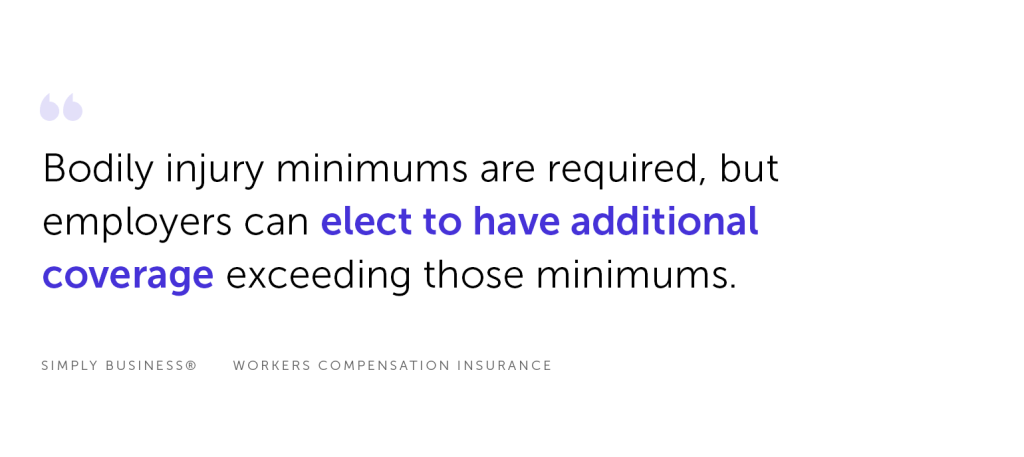Wisconsin Workers’ Compensation Insurance
Are you running a small business in America’s Dairyland? Here’s out guide to workers’ compensation insurance in WI.
Simply Business is pleased to provide tailored insurance options from:
Do you own and operate a business? If so, you know just how important it is to protect both your employees and your business against workplace injuries. While your first line of defense is maintaining a safe worksite, you usually can’t avoid all accidents.
That’s where workers’ compensation insurance comes in. Workers’ compensation is a type of insurance policy that provides benefits for workers who are injured or become ill as a result of their jobs. Common workers’ compensation claims include strains, burns, broken bones, and even concussions.
These policies are the responsibility of and paid for by the employer. Benefits can vary between states, so it’s important to adhere to your state’s requirements.
Wisconsin Workers’ Compensation Insurance Pool
When seeking coverage, reach out to an agent who writes Wisconsin worker’s compensation policies. If your business is refused coverage, that’s where the Wisconsin Workers’ Compensation Insurance Pool comes in.
If you are denied coverage, you can request coverage via the Wisconsin Compensation Rating Bureau. This is called the Wisconsin Workers’ Compensation Insurance Pool.
This also applies to out-of-state employers who have employees working in Wisconsin. If your business’s workers’ comp policy was written by an agent who is not licensed in Wisconsin, you will need to contact an agent who is licensed to do so. They will help get your business — and your employees who are working in Wisconsin — covered.

Do I Need Workers’ Comp Insurance in Wisconsin?
Wisconsin passed a Workmen’s Compensation Act in 1911. As a result, the state has specific criteria for businesses that require workers’ comp coverage. Circumstances where a business is required to hold a policy include:
- Businesses with three or more full- or part-time employees
- Businesses with at least one employee and has paid $500 or more in gross combined wages for work performed in Wisconsin
- Farms employing at least six employees all working on the same day for at least 20 days during the calendar year
It’s also worth noting that a company cannot provide workers’ compensation benefits for another company’s employees.
While most companies in the state obtain worker’s comp policies from insurance companies, some companies with solid financials may opt to self-insure. This means that the company is prepared to pay out-of-pocket for worker’s compensation claims from their employees. To be self-insured, the employer must obtain authorization from the Wisconsin Department of Workforce Development.

Penalties for Not Having Workers’ Compensation Insurance in Wisconsin
Since worker’s compensation is mandatory for many Wisconsin businesses, the Worker’s Compensation Act is strictly upheld. Employers without necessary coverage — or a lapsed policy — can expect any of the following:
- A fee ranging from $750 to twice the amount of the unpaid premium during the period of the policy lapse. Additional fees may apply.
- Complete closure of your business and all related actions until sufficient coverage is acquired.
- Paying out-of-pocket for any uninsured benefit claims for which an injured or sick employee is eligible.
To avoid these penalties, it is crucial that you ensure your business is complying with the Worker’s Compensation Act. If your business meets the criteria for required worker’s comp, be sure to have a policy written. If you’ve already had a policy written, check in to make sure it is up-to-date and has not lapsed.

Worker’s Comp is Complicated — We Can Help
Insurance can be jargon-heavy and confusing. When it comes to mandated coverage — such as worker’s compensation — it can be difficult to know where to begin. Your business is important to you, your employees, and your community. Make sure it’s covered within the Wisconsin state requirements.
We work with small business owners to find coverage that works for them. Start your workers’ compensation quote with us today. Tell us about your business, and we can take it from there together.

How Much Does Workers’ Compensation Insurance Cost in Wisconsin?
Your workers’ compensation premium will vary, based on a number of factors. These might include your industry, previous exposures, the state where your business is located, and your total payroll.
For insurance rating purposes, different industries are grouped together to form different classifications. Industries that share a lot of the same risks will form their own classification.
A wheat farm is unlikely to share many risk factors, for instance, with a tailor. It may, however, have many of the same common exposures as a dairy farm. As a result, the two farms may be classified similarly.
This classification will impact your worker’s comp insurance rates. According to the Wisconsin Compensation Rating Bureau, the annual premium for farms is $900, while the minimum premium for tailors is $605 as of October 1, 2021.
Wisconsin Worker’s Compensation Insurance Statutory Limits
A statutory limit is the minimum amount of liability coverage legally required in your state, as well as the maximum benefits you can claim within a policy term. The Wisconsin statutory limits per employee are:
- $100,000 bodily injury per occurrence.
- $100,000 bodily injury by disease per occurrence.
- $500,000 maximum limit for bodily injury by disease in a single policy term. Basically, all claims in one term cannot exceed that limit.
While the bodily injury minimums are required, employers can elect to have additional coverage exceeding those minimums.

Protecting Your Business’s Future
While hiring more employees often means more responsibilities and requirements, it may also mean your business is growing. Worker’s compensation insurance may be required as you add employees, but its benefits go beyond that.
Workers’ comp helps ensure you and your employees are protected in the event of an on the job injury or illness. This can help your employees feel more secure. And, ultimately, it can save you from major financial losses. Learn more about protecting your business at Simply U.
Workers’ Comp Information in Other States
Simply Business has state information for workers’ compensation insurance in California, Colorado, Florida, Georgia, Illinois, Maryland, Minnesota, New Jersey, New York, North Carolina, Pennsylvania, Texas, Wisconsin.